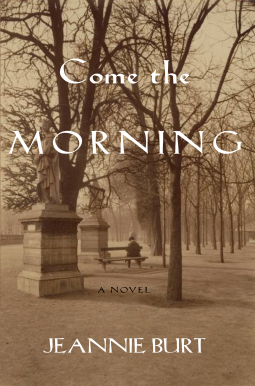
Come the Morning
by Jeannie Burt
This title was previously available on NetGalley and is now archived.
Send NetGalley books directly to your Kindle or Kindle app
1
To read on a Kindle or Kindle app, please add kindle@netgalley.com as an approved email address to receive files in your Amazon account. Click here for step-by-step instructions.
2
Also find your Kindle email address within your Amazon account, and enter it here.
Pub Date Oct 15 2019 | Archive Date Jan 14 2020
Muskrat Press, LLC | Independent Book Publishers Association (IBPA), Members' Titles
Talking about this book? Use #ComeTheMorning #NetGalley. More hashtag tips!
Description
Ezekiel Harrington is a struggling Philadelphia gallery owner at the turn of the Twentieth century. A chance encounter reconnects him with a childhood friend, Robert Henri, who is now studying art. Henri introduces Ezekiel to a cadre of striving artists. Among them is a crude Bohemian woman of tremendous talent. Immediately, Ezekiel despises her.
His business continues to languish until a request for portrait comes in. The customer is a member of high Philadelphia society and insists the Bohemian woman will paint it. She is to use Ezekiel’s gallery for the sittings. He doesn’t want her in his store at all until he hears the terms of the deal. It is on the shoulders of this illicit woman that his fortunes begin to take a remarkable turn.
As he bumbles through turn-of-the century Philadelphia and Paris, his changing feelings for the unacceptable woman thrust him on an intense and unexpected course.
A Note From the Publisher
PRINT, TRADE PAPER: 9780989544665
Advance Praise
“Philadelphia's art world at the turn of the century receives close inspection and serves as the historical backdrop for Come the Morning, a novel about a struggling gallery owner, Ezekiel Harrington, who must come to terms not only with financial challenges to his livelihood, but his perceptions of women entering the art world.
-
The best novels about adversity cover not just worldly events and their impact, but the process of changing prejudices, perceptions, and reactions. Jeannie Burt's Come the Morning falls into this 'best' category because it deftly considers the evolution of Ezekiel's gallery, his ongoing financial struggles, and his paradigm-changing encounter with an unforgettable woman whom he at first despises.
He's become used to watching his money dwindle. He hasn't become used to finding that his heart lies on the opposite side of sound financial decision-making processes.
-
Burt hones a fine ability to capture the process of dwindling returns in not only Ezekiel's heart and mind, but in Philadelphia's atmosphere and even its environment, as the changing seasons progress: "Late summer bled into a gentle decline toward fall, days warm and dry at the first of the month, but toward the end of September, cloud and sky warred and sent the city drenchings."
This atmospheric touch adds a fine adjunct to a story that delves into not just one man's changes, but a society in flux: "Men like Astor, Carnegie, Cooke, Morgan, Fisk, Vanderbilt, Stanford, Harriman, were making millions. Reports of their dealings burrowed deep inside him. Yet there was dark resistance to all this as well: labor. Laborers, miners, railroad men, steel men, dock workers, the very men whose existence depended on the industrialists, were beginning to nip at the hands that fed them. They were forming unions, calling themselves “knights.” Authorities pushed back. Not long ago, the militia had gunned down two thousand Poles in Wisconsin who were striking for eight-hour workdays. In Chicago, a bombing had killed both workers and police at the McCormick Harvesting Machine Company. In Louisiana, Negro sugar workers were shot when they tried to form a union. Ezekiel had paid little attention to it when it began, but now the very idea of labor inhibiting business posed a threat: What would happen to him if Hainsworth wanted more money? What would happen if JJ insisted he be paid like his older brother? What if they demanded a higher cut from their sales?"
-
Ezekiel has spent his life struggling and believing there is a better destiny for him. From his generosity towards his family, which enables his aunt and uncle to keep their house, to his shifting relationships and a journey from Philadelphia to Paris that leads him further into the art community's connections, readers follow the progression of his heart and soul as they receive historical tidbits based on accurate information about his times.
-
Ezekiel's evolution involves realizing the emotional connections he has squandered even as he's pinched pennies and struggles. These epiphanies coalesce in a powerful set of discoveries that keep readers engaged and involved as he faces truths about his life only when it's almost too late to change.
-
As Henri and his art friends and Soap enter and change his life, readers come to recognize the wellsprings of discontent and achievement and the types of encounters that offer opportunities for personal transformation.
Evocative, reflective, and historically revealing, Come the Morning does a fine job of dovetailing a sense of self with a sense of place and purpose, also revealing the plights of women, artists, entrepreneurs, and the circles that both support and defeat them.
-
Readers seeking a moving story of artistic circles and life change will find that Come the Morning operates smoothly and is compelling on many different levels, making it a top recommendation.” --MIDWEST BOOK REVIEW
-
“Come the Morning, the sequel to novelist Jeannie Burt’s Seasons of Doubt, will immediately captivate readers as they continue to explore the life of Ezekiel Harrington, a good friend of Robert Henry Cozad, later to become Robert Henri, one of America’s greatest artists and art instructors. While the Seasons of Doubt explores the community life of Cozad, Nebraska, Come the Morning returns to the life of Harrington although now he is now living in Philadelphia and then Paris, along with his continuing friendship with Henri who is now an aspiring artist.
-
The characters of Come the Morning come to life as they did in her previous work, and one can easily visualize the fascinating story of someone who knew Robert Henri well. Burt is skilled at portraying the turn of the last century, and a time in which Henri rose as one of America's most important and inspirational creative leaders. We are waiting for the next book in this series!” --ROBERT HENRI MUSEUM
-
“Jeannie Burt's spare writing style captures the narrow consciousness of a teenage Ezekiel Harrington who travels by train from the hard frontier of 1880's Cozad, Nebraska, to Gilded Age Philadelphia to collect his inheritance. Come the Morning describes a gritty, unforgiving world of poverty, boom-bust, and European migration in the midst of Ezekiel's single-minded quest for wealth and revenge. Come the Morning provides a window to the struggles of young artists defying convention in seeking to express themselves in new ways, in the process bringing an emerging French Impressionism to America.
-
In both subtle and dramatic ways Burt sketches the development of truly interesting characters whose surprise twists and turns enrich her novel throughout. Their experiences provide insight to the growing women's movement of the late nineteenth century--the responses of both women and men--including the intriguing development that many women, especially those most artistic and cosmopolitan, chose not to marry. All in all, Come the Morning, is a superbly engrossing sequel to Jeannie Burt's earlier, The Season's of Doubt, and makes a significant contribution to historical fiction of late nineteenth century America.” – JERRY BERBERET, PhD, AMERICAN HISTORIAN
-
“COME THE MORNING is Jeannie Burt's third novel. I loved the first two. This one? Yup. Ditto. It's a sequel to her second one (THE SEASONS OF DOUBT), continuing the story of young Ezekiel Harrington, who, following the death of his hardworking mother in the small town of Cozad, Nebraska, arrives in Philadelphia nearly penniless, to collect his inheritance through his banker uncle. There are disagreements and misunderstandings, and 15 year-old Ezekiel begins a long, hard road towards adulthood and financial independence. It is 1883. He gets a room, finds a job in a failing stationery store, and serendipitously reconnects with his boyhood friend, Bob Cozad, now using the name Robert Henri, who is part of a growing group of ambitious young artists.
-
We follow Ezekiel's fluctuating fortunes for the next forty-five years. The young man displays a determination to succeed - perhaps to the detriment of his personal life - that will carry him through some very hard times. Along the way, Burt provides us with vivid descriptions of the Great White Cyclone blizzard that shut down most of the eastern seaboard, the economic hardships of the 1890s depression that left nearly half of American workers hungry and unemployed, as well as the rapidly changing art world on both sides of the Atlantic. Many secondary and peripheral characters here, like Robert Henri, are very real people, as Burt sets her story firmly in its historical context of Philadelphia and, later, Paris, from the 1880s well into the 1920s.
-
I compared the previous novel, with its western setting, to the writings of Cather and Mildred Walker. This one, with its urban settings - shown from the vantage points of the near destitute to the ultra-rich - brings to mind Crane's MAGGIE, Sinclair's THE JUNGLE, or the more genteel worlds of Henry James and Edith Wharton, although the Alger rags-to-riches theme is continued here too. Women's rights - which were all but non-existent in those times, and also showed up in THE SEASONS OF DOUBT - is a recurring theme too, as evidenced in this passage about unions and the economic woes of 1893.
-
"Even women were causing problems. If Labor wasn't stirring up enough trouble, women's badgering and snits about their rights were making up for it. Loud, raucous women seemed to be everywhere marching and raising their fists, waving placards and screaming speeches. Could nothing ever stay as it was?"
-
Hmm … Sounds somehow oddly contemporary, no?
-
“Come the Morning” is a deeply satisfying novel of scope and depth, a book to be sampled slowly, to be savored like a fine wine or a gourmet meal. I read it a little at a time over the course of a couple of weeks, mostly because I didn't want it to end. This is a beautiful book, a throwback to an earlier time in American literature. I so hope it will be discovered and read by booklovers everywhere. Yes. I loved it.”-- TIM BAZZETT, AUTHOR OF “BOOKLOVER”
Available Editions
| EDITION | Ebook |
| ISBN | 9780989544672 |
| PRICE | $5.99 (USD) |







